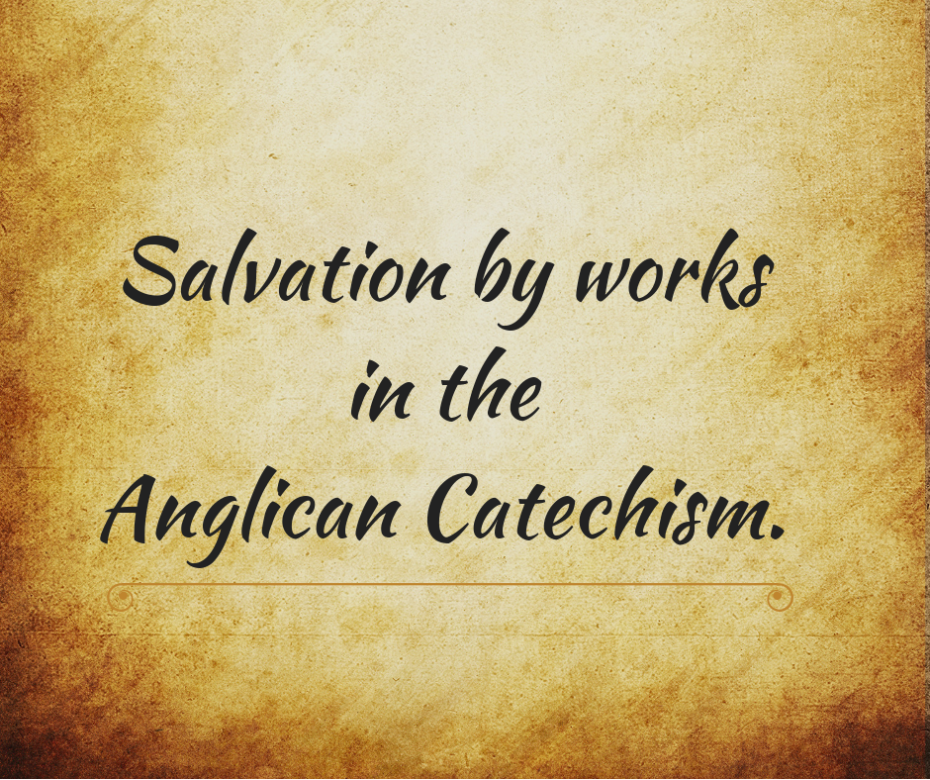I’ve been reading several Anglican writers recently who I think are Free Grace friendly. For example, did you know that Dallas Seminary was co-founded by an Anglican priest named W. H. Griffith Thomas?
So I started poking around the Anglican Church in North America (ACNA) website.
The ACNA was formed in reaction to the liberalism, libertinism, and rank idolatry that is so pervasive in the Episcopal Church (follow here). Conservative and Evangelical Anglican groups could no longer tolerate being in the Episcopal Church, so they formed their own communion.
I saw that the ACNA put out a catechism for “trial use,” entitled To Be a Christian: An Anglican Catechism. I was very disappointed to read what they say about salvation. Here are questions 11–14. Do you see all the places where they make works a condition of salvation? I’ve italicized the key words.
- How should you respond to the Gospel of Jesus Christ? I should repent of my sins and put faith in Jesus Christ as my Savior and my Lord. (Romans 10:9-10; Acts 16:31)
- What does it mean for you to repent? To repent means that I have a change of heart, turning from sinfully serving myself to serving God as I follow Jesus Christ. I need God’s help to make this change. (Acts 2:38; 3:19)
- What does it mean for you to have faith? To have faith means that I believe the Gospel is true; I acknowledge that Jesus died for my sins and rose from the dead to rule over me; I entrust myself to him as my Savior; and I obey him as my Lord. As the Apostle Paul said, “If you confess with your mouth that Jesus is Lord and believe in your heart that God raised him from the dead, you will be saved” (Romans 10:9).
- How may a person repent and place faith in Jesus Christ? Anyone may repent and place their faith in Jesus Christ at any time. One way to do this is by sincerely saying a prayer similar to the Prayer of Repentance and Faith given above. (John 15:16; Acts 16:31-34; Romans 10:9; Hebrews 12:12)
The Anglican Catechism should have been clear that salvation is by:
Faith + nothing.
Instead, the Anglican Catechism makes your salvation depend upon:
Faith + repentance, turning from sin, serving God, following Jesus, entrusting yourself, obeying, and sincerely saying a prayer.
That’s not salvation by faith alone, but salvation by works—a lot of works.
I did a search for the term “justification” and could not find a single occurrence in that 72-page document. They write about “sanctification,” but not “justification!”
In his book, The Protestant Face of Anglicanism, Paul F. M. Zahl makes clear that justification is part of Anglican theology:
“The implications of one phrase from Article XI are important. They carry us forward to a Protestant-Anglican doctrine of grace. The phrase is this: ‘that we are justified by Faith only, is a most wholesome Doctrine, and very full of comfort’” (p. 78).
Zahl goes on to explain what justification means and how the Anglican Reformers emphasized it.
I give that quote to show that Anglicans did teach, and many still do teach, justification by faith only. So why does the ACNA Catechism get it wrong?
Of course, official documents do not always reflect what is preached in the pulpit. These ACNA churches may be preaching justification by faith alone, even if their catechism denies it. But here’s the danger. Based on Romans 1:22-27, I believe the Episcopal Church is under the curse of God. If the ACNA is preaching salvation by works, then based on Gal 1:9, they are accursed, too.


